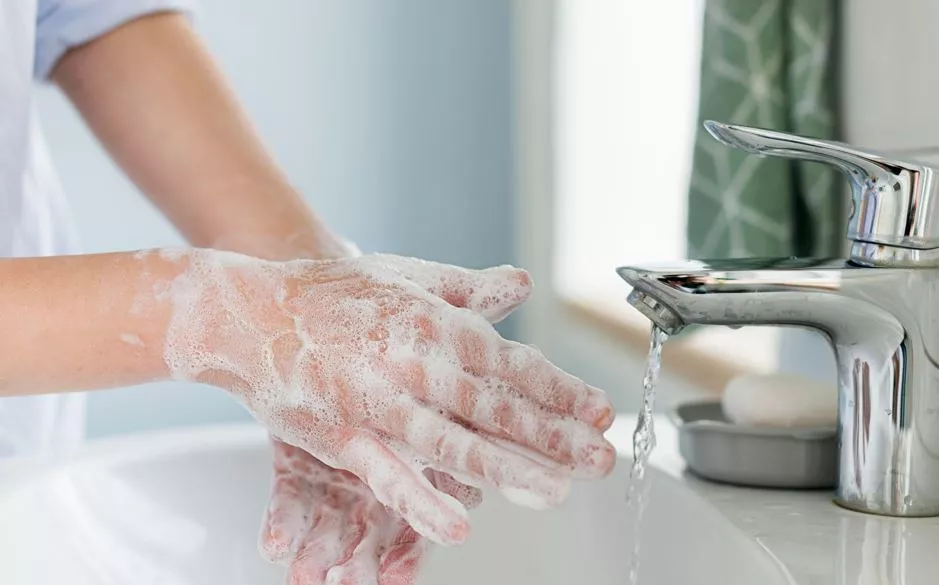Germs can enter your body when you touch your nose, mouth, or eyes after getting into contact with infected surfaces because they are present everywhere. Despite your immune system's greatest efforts, not all of these invaders may be defeated. Here, the straightforward practice of washing one's hands with soap and water is essential for avoiding sickness.
Handwashing Statistics: Statistics from the Centers for Disease Control and Prevention (CDC) reveal the significant impact of handwashing:
- 20% of colds and other viruses can be prevented by washing your hands.
- Additionally, it can stop 30% of infections caused by diarrhoea.
The Effect of Other People's Handwashing Practises
Your health can be influenced by the handwashing practices of those around you. People who neglect hand washing run the risk of unintentionally contaminating objects and surfaces, such as doorknobs.
Taking Charge of Your Health: Even though you might not be able to influence what other people do, you can safeguard your health by practising more careful handwashing. In the following circumstances, think about washing your hands:
In the following circumstances, think about washing your hands:
- Bathroom Breaks and Diaper Changes: After using the bathroom or handling diapers.
- Pre-Meal Routine: Before eating a meal or snack.
- Garbage Handling: After taking out the trash.
- Food Preparation: While cooking or handling food.
- Interaction in Public: Following touching things in public.
- Contact with Ill Individuals: Following contact with a sick person.
- Toilet Cleaning: Following toilet cleaning.
- Eye Care: Before changing contact lenses or applying eye drops.
- Handling Raw Meat: Preventing foodborne infections is especially important.
- Dirty Hands: Whenever you notice dirt or grime on your hands.
- Money Handling: After dealing with money.
- Taking the Public Transit: Especially when the flu is prevalent.
- Respiratory Actions: Following a cough, sneeze, or nose blow.
Why Handwashing Should Be a Priority?
Washing hands with soap and water is one of the most important ways to protect your health and prevent you from passing germs to others. Some diseases easily spread when the hand is not well cleaned up after touching something which is dirty or infected. Although not all germs are harmful, they may get into our body through the mouth, nose or eyes and result in diseases. This underlines the imperativeness of cleaning hands, particularly when they have been exposed and in such conditions as floods and flu pandemics where viruses can travel with great speed injuring others.
- Invisible Germs on Your Hands: Your hands may contain invisible germs that are not visible to the unaided eye. Handwashing frequently aids in removing these covert dangers.
- Maintaining Children's Health and Attendance at School: Promoting handwashing among young children helps reduce illness, which in turn reduces school absences and fosters a healthy learning environment.
- Preventing Illness: Handwashing is a strong preventive measure for illness. While getting vaccinated against the flu every year is important, regular hygiene practices like frequent hand washing with soap and water can help to further protect your health.
Anyone may learn and incorporate handwashing into their daily routine because it is a straightforward but effective practice. Using an alcohol-based hand sanitiser with at least 60% alcohol content can be a practical alternative in emergency situations where clean, flowing water may not be accessible. Even though these sanitisers can lessen the amount of germs on your hands, it's important to remember that they cannot get rid of all bacteria.
Getting the hang of proper handwashing only takes about 20 seconds and comprises five simple steps:
- Apply soap after wetting your hands with clean, flowing water and closing the tap.
- Rub your hands together and the soap to get a lather.
- Spend at least 20 seconds cleaning your hands.
- Clean, flowing water should be used to completely rinse your hands.
- Use a fresh towel to dry your hands or let them air dry.
Washing Your Hands Can Save Lives:
It is essential that we resolve as a group to make handwashing a widely practised life-saving habit on this Global Handwashing Day in collaboration with Aster Medcity. It should be our goal to make it thoroughly engrained in our everyday routines. Therefore, for this to work we need to work together to promote innovation and implement practical, applicable and scalable initiatives that align with the three core elements of hand hygiene.
Conclusion:
Make handwashing a part of your daily routine to stay healthy and protect those around you – it’s an easy but powerful habit that can save lives. It's time to act, innovate, and protect lives through the power of clean hands.





